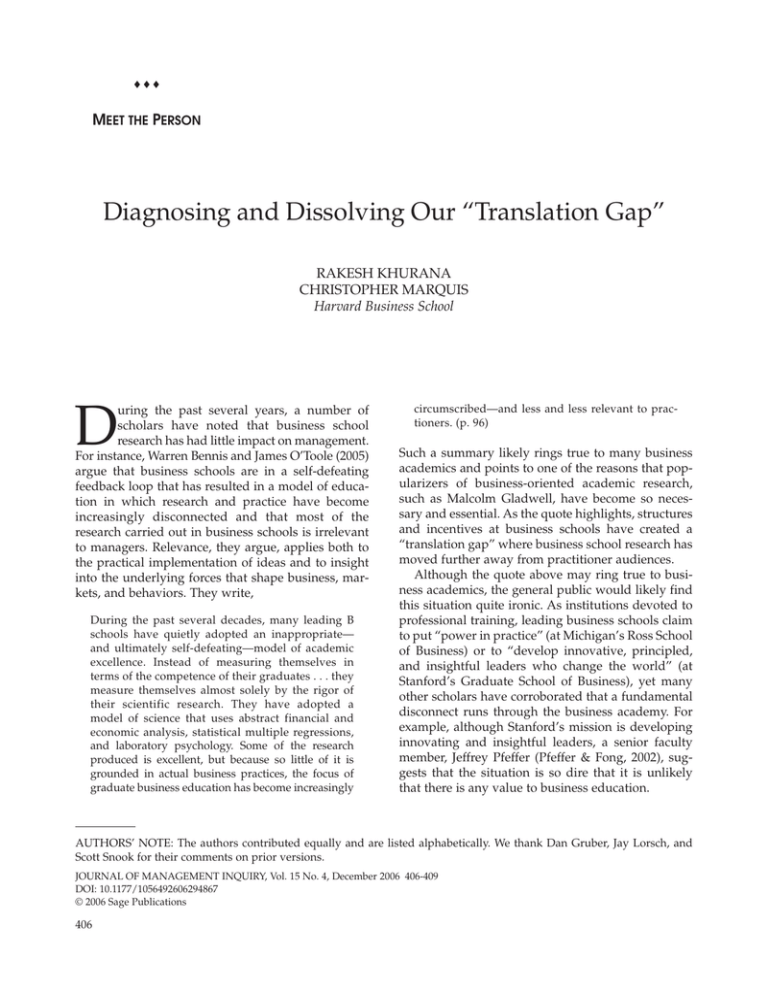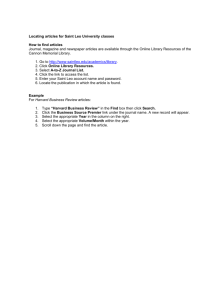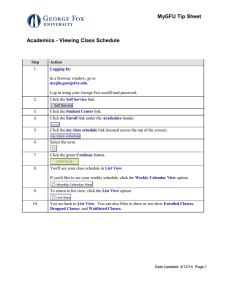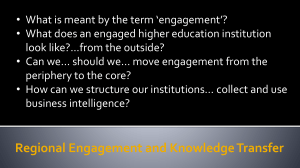D Diagnosing and Dissolving Our “Translation Gap” M P
advertisement

♦♦♦ MEET THE PERSON Diagnosing and Dissolving Our “Translation Gap” RAKESH KHURANA CHRISTOPHER MARQUIS Harvard Business School D uring the past several years, a number of scholars have noted that business school research has had little impact on management. For instance, Warren Bennis and James O’Toole (2005) argue that business schools are in a self-defeating feedback loop that has resulted in a model of education in which research and practice have become increasingly disconnected and that most of the research carried out in business schools is irrelevant to managers. Relevance, they argue, applies both to the practical implementation of ideas and to insight into the underlying forces that shape business, markets, and behaviors. They write, During the past several decades, many leading B schools have quietly adopted an inappropriate— and ultimately self-defeating—model of academic excellence. Instead of measuring themselves in terms of the competence of their graduates . . . they measure themselves almost solely by the rigor of their scientific research. They have adopted a model of science that uses abstract financial and economic analysis, statistical multiple regressions, and laboratory psychology. Some of the research produced is excellent, but because so little of it is grounded in actual business practices, the focus of graduate business education has become increasingly circumscribed—and less and less relevant to practioners. (p. 96) Such a summary likely rings true to many business academics and points to one of the reasons that popularizers of business-oriented academic research, such as Malcolm Gladwell, have become so necessary and essential. As the quote highlights, structures and incentives at business schools have created a “translation gap” where business school research has moved further away from practitioner audiences. Although the quote above may ring true to business academics, the general public would likely find this situation quite ironic. As institutions devoted to professional training, leading business schools claim to put “power in practice” (at Michigan’s Ross School of Business) or to “develop innovative, principled, and insightful leaders who change the world” (at Stanford’s Graduate School of Business), yet many other scholars have corroborated that a fundamental disconnect runs through the business academy. For example, although Stanford’s mission is developing innovating and insightful leaders, a senior faculty member, Jeffrey Pfeffer (Pfeffer & Fong, 2002), suggests that the situation is so dire that it is unlikely that there is any value to business education. AUTHORS’ NOTE: The authors contributed equally and are listed alphabetically. We thank Dan Gruber, Jay Lorsch, and Scott Snook for their comments on prior versions. JOURNAL OF MANAGEMENT INQUIRY, Vol. 15 No. 4, December 2006 406-409 DOI: 10.1177/1056492606294867 © 2006 Sage Publications 406 Khurana, Marquis / TRANSLATION GAP WHAT EXPLAINS THIS DISCONNECT? Christopher Jencks and David Riesman (1968), in their study on research universities, warned about a status anxiety that academics in professional schools experience. The temptation of professional schools, they noted, is that they become more enamored of the disciplines that inform their practice than the professions to which they are linked: As they look across the street instead of into their students’ futures, they become more concerned with the “broad” academic and quasi-academic skills they all value in common [and] less concerned with the “narrow” professional skills that set them apart from one another and from the university as a whole. (p. 252) Given the acute status anxiety about their academic bona fides, many business school academics were especially vulnerable to identifying themselves in disciplinary terms, especially after the publication of the highly critical Ford and Carnegie foundation reports that questioned business school academics’ commitment to research. Stanford’s former dean, Robert Jaedicke (Schmotter, 1989), noted that by the early 1980s a greater proportion of the faculty identified themselves not as business school professors but with a particular social science discipline: [Faculty] are much quicker to align themselves with disciplines today than in the era in which I grew up. . . . When I entered the academic world, I never thought very hard about whether or not I would receive tenure. It was a growth industry, and you took for granted that if you aligned yourself with an institution that you like, and it liked you, everything would work out. But times have changed. . . . Not only is the quality of Ph.D. education better today, but standards are also higher and the evaluation process for tenure is more rigorous on all campuses. I think it’s natural to expect professors to respond by aligning themselves with their disciplines. They need to have market value that extends beyond just one institution. (p. 6) Among the top tier of business schools, this disciplinary orientation has been further reinforced by the faculty hiring and promotion processes. In subjects such as strategy, organizational behavior, and finance, prospective job candidates are increasingly sorted and selected not by the particular phenomenon they study or its relevance to managerial practice 407 but by whether their research is publishable in a firsttier disciplinary journal. In both form and content, the business school faculty promotion system now increasingly resembles the one found in university arts and sciences departments. The turn toward disciplinary research, while admittedly having a major impact on the rigor and quantity of research, did change the attitudes and values of business school researchers with respect to considering the managerial implications of their research. Lyman Porter and Lawrence McKibbin (1988) note many business school scholars are in fact indifferent to the concerns of management: “Most business school professors are purposely aiming their research reports toward their academic brethren and . . . do not care whether such publications are comprehensible to practicing managers or not” (p. 167). WHAT CAN BE DONE? We feel that the need for business school academics to connect their research to practice is of greater import today than at any time in our history. Unlike other academic subjects, few institutions command the social attention of contemporary society and absolute power than do corporations. As the sociologist Charles Perrow (1991) noted, we live in an organizational society: Organizations are the key to society because large organizations have absorbed society. They have vacuumed up a good part of what we have always thought of as society, and made organizations, once a part of society, into a surrogate of society. (pp. 725-726) Under such a situation, academics at business schools should arguably be at the center of public debates about the role of the corporation, yet we frequently find ourselves marginalized in public debates to policy experts and economists. No doubt in part because of a perception that there is a lack of ability or anything to say. On the research front, we are slightly more optimistic than either Bennis and O’Toole or Pfeffer and Fong and feel that the recent trajectory of organizational scholarship suggests that research is becoming more relevant to understanding the issues of today. As Davis and Marquis (2005) note, although organizational research in the 1970s and 1980s focused on elaborating abstract theoretical paradigms, research 408 JOURNAL OF MANAGEMENT INQUIRY / December 2006 in the 1990s was characterized by a problem-driven approach that is increasingly connected to daily management and public policy challenges. For example, they found that approximately 90% of the articles published in the theoretically rigorous Administrative Science Quarterly in the 1990s focused on topical and contextually situated issues as opposed to elaborating an extant theoretical paradigm. This may be a surprise to many business scholars socialized at a time when disciplinary orientation and theoretical contribution was paramount. But clearly there has been a shift in the focus of organizational research in the past decade and a half. Examples run the gamut from micro studies of how knowledge workers experience performance (Quinn, 2005) to more macrolevel questions such as why and how do corporations’ socially responsible activities influence their finances (Margolis & Walsh, 2003). In the tradition of theorists such as Marx and Weber, whose own work was an attempt to explain the dramatic transformations of their times, we are living in a society of dramatic transformation. And our best research and theorizing reflects this struggle. Focusing on contemporary problems is not a suggestion that organizational scholars should become journalists and be documenters of social issues. This type of middle-range, contextually situated theorizing illustrated above is reminiscent of pioneering practice-oriented business research that argued theory was a “walking stick” (Roethlisberger, 1977). Under this perspective, researchers are not wedded to theoretical traditions but view theories as valid to the extent that they inform existing circumstances. The current approach to studying phenomena by testing competing and complementary perspectives fits well with this perspective. For example, in a recent issue of Administrative Science Quarterly, Phillips (2005) studied how causes of gender imbalance in Silicon Valley law firms are informed by institutional-, network-, and power-oriented theories. This article makes a novel contribution to the theories of interest, but the findings that historically developed organization structures either promote or hinder the advancement of women have clear practical implications. The interesting question then becomes: Why isn’t such research with clear management implications diffused into wider society? It is understandable that arcane debates on organizational theory do not gain a widespread audience, but why not problem-driven research with clear implications? Here we feel that some of the structural issues highlighted by Bennis and O’Toole come into play. Beyond just incentives on the appropriate types of research, we feel that the key element in bridging our translation gap is not simply the development of a competence in individual researchers but the creation of institutional mechanisms at business schools that can showcase and celebrate faculty research. These could include a greater focus on connecting faculty research expertise with their teaching responsibilities, getting early-career faculty more involved in executive education, and even creating new honor and reward systems that foster research that influence public debate. As one specific example, here at Harvard Business School (HBS), we have not only the Harvard Business Review but also HBS Working Knowledge, an informal e-mail newsletter that has a circulation of more than 100,000 practitioners. Wharton has a similar mechanism to diffuse faculty research more widely (Knowledge@Wharton). Such venues provide an opportunity to help academics think through connections with practice and also put researchers directly in touch with relevant practitioner audiences. If a business school is to truly have “power in practice,” it needs to put its money where its mouth is. Michigan, for example, has a skilled press office that issues press releases and summaries of faculty research. The assumption of such an approach is that journalists will then translate the research into a story of interest to the broader public. Our experience is that this concrete step of translation needs to be taken within business schools by professionals experienced in academic research and reaching popular audiences. Such a perspective suggests that practitioners are not just an audience to reach but a constituency with whom to engage in dialog. In closing, we are not suggesting that business school academics should aim for the popular audience that Gladwell does. But the interview with Gladwell highlights a larger issue: the need for business school academics to be better translators of their research, as Gruber said, to strive for “more of a blend.” Like Bennis and O’Toole suggest, there may be structural causes of the observed translation gap. But we are more sanguine about the future. We feel that on the research front the increase in problemfocused research since the 1990s brings research closer to current management issues, and we suggest that translation is not an individual issue but that business schools should develop some institutional infrastructure to facilitate and support this translation. Khurana, Marquis / TRANSLATION GAP REFERENCES Bennis, W. G., & O’Toole, J. (2005). How business schools lost their way. Harvard Business Review, 83(5), 96-104. Davis, G. F., & Marquis, C. (2005). Prospects for theory about organizations in the early 21st century: Institutional fields and mechanisms. Organization Science, 16, 332-343. Jencks, C., & Riesman, D. (1968). The academic revolution. Garden City, NY: Doubleday. Margolis, J. D., & Walsh, J. P. (2003). Misery loves companies: Rethinking social initiatives by business. Administrative Science Quarterly, 48, 268-305. Perrow, C. (1991). A society of organizations. Theory and Society, 20, 725-762. Pfeffer, J., & Fong, C. (2002). The end of business schools? Less success than meets the eye. Academy of Management Learning & Education, 1(1), 78-96. Phillips, D. J. (2005). Organizational genealogies and the persistence of gender inequality: The case of Silicon Valley law firms. Administrative Science Quarterly, 50, 440-472. Porter, L. W., & McKibbin, L. E. (1988). Management education and development: Drift or thrust into the 21st century? New York: McGraw-Hill. 409 Quinn, R. W. (2005). Flow in knowledge work: High performance experience in the design of national security. Administrative Science Quarterly, 50, 610-641. Roethlisberger, F. J. (1977). The elusive phenomena: An autobiographical account of my work in the field of organizational behavior at the Harvard Business School. Cambridge, MA: Harvard University Press. Schmotter, J. W. (1989, Autumn). Dean Robert Jaedicke. Selections, 1-7. RAKESH KHURANA is an associate professor in the organizational behavior group at the Harvard Business School. His research focuses on the processes and mechanism by which corporate and business leaders are socialized and selected. His book, Searching for a Corporate Savior: The Irrational Quest for Charismatic CEOs (2002), focused on the CEO labor market. His forthcoming book, From Higher Aims to Hired Hands: The Social Transformation of Business Education, examines the development of American business education as a professionalization project. CHRISTOPHER MARQUIS is an assistant professor in the organizational behavior unit at the Harvard Business School. His research focuses on how firm behavior is historically contingent and how environmental conditions during founding periods leave a lasting imprint on organizations. He has examined the effects of these processes in the context of community-based social networks and in the history of 20th-century U.S. banking. He received his Ph.D. in sociology and organizational behavior from the University of Michigan.




